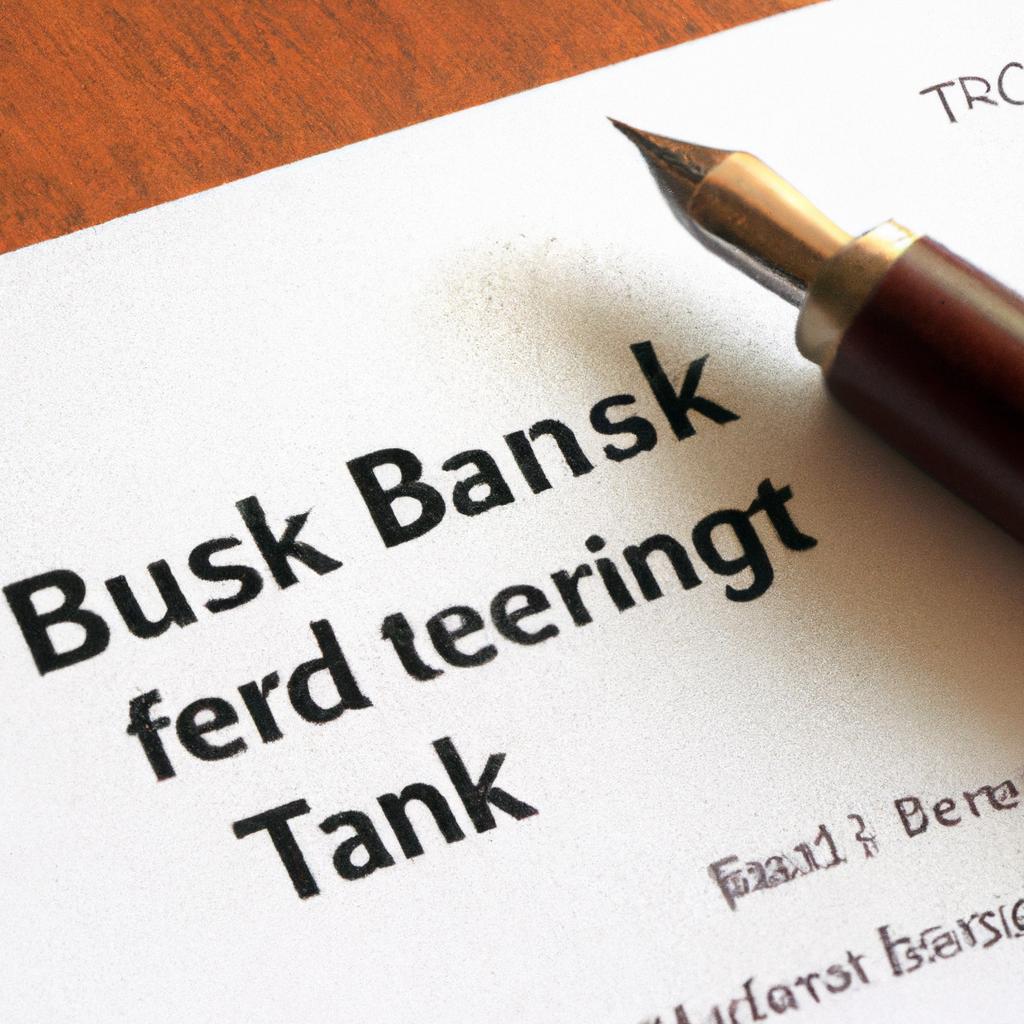Navigating the complexities of estate planning can often feel like traversing uncharted waters. As experienced legal navigators, we at Morgan Legal Group, based in the bustling metropolis of New York City, understand the importance of safeguarding your assets for future generations. One common inquiry that arises in the realm of trust planning is whether or not to include bank accounts within the protective walls of a trust. In this article, we delve into the rationale behind this decision and provide insight on the potential benefits and considerations of placing your bank accounts in a trust. Let us be your guide as we unravel the intricacies of trust planning and help you chart a course towards a secure financial future.
Considerations for Including Bank Accounts in Your Trust
When considering whether or not to include your bank accounts in your trust, there are several important factors to take into account. One key consideration is the type of account you have. Certain accounts, such as payable on death (POD) accounts or joint accounts with rights of survivorship, may already have beneficiary designations that will determine where the funds go upon your passing. In these cases, including the account in your trust may not be necessary.
However, if you have accounts that do not have beneficiary designations or are not jointly owned, putting them in your trust can help streamline the probate process and ensure that your assets are distributed according to your wishes. Additionally, by including your bank accounts in your trust, you can provide your trustee with immediate access to these funds upon your passing, allowing them to manage your estate more efficiently.

Pros and Cons of Putting Bank Accounts in Your Trust
When considering whether to put your bank accounts in your trust, it’s important to weigh the pros and cons carefully. One potential advantage is that placing your bank accounts in a trust can help streamline the probate process, making it easier for your beneficiaries to access the funds after your passing. In addition, by including your bank accounts in your trust, you can ensure that the assets are distributed according to your wishes and avoid the public nature of probate proceedings.
On the other hand, there are some potential drawbacks to putting your bank accounts in your trust. One consideration is that transferring your accounts to a trust can involve some administrative work and may incur fees. Additionally, if you have multiple bank accounts, managing them within a trust structure could make it more complex to keep track of your finances. It’s important to consult with an experienced estate planning attorney to discuss your individual circumstances and determine the best course of action for your estate plan.

How Bank Accounts in a Trust Can Streamline Your Estate Planning
When considering estate planning, it is essential to explore the benefits of placing your bank accounts in a trust. By incorporating your accounts into a trust, you can streamline the transfer of assets to your beneficiaries, avoid potential probate issues, and maintain privacy regarding your financial affairs.
Placing your bank accounts in a trust can also help you manage your assets more efficiently during your lifetime and after your passing. With a trust in place, you can appoint a trustee to oversee the distribution of funds according to your wishes. Additionally, by consolidating your accounts into a trust, you can simplify the administration process for your loved ones and ensure a smooth transition of wealth to the next generation.

Expert Recommendations for Managing Bank Accounts in Your Trust
When it comes to managing your bank accounts in your trust, there are a few key considerations to keep in mind. One important factor to consider is the type of assets you have in your bank accounts. If you have a significant amount of money in your accounts, it may be beneficial to transfer them into your trust to ensure they are properly managed and distributed according to your wishes.
Another important consideration is the level of control you wish to maintain over your bank accounts. Placing your accounts in your trust can help streamline the management of your assets and provide added protection in the event of incapacity or death. It is always best to consult with an experienced estate planning attorney to determine the best course of action for managing your bank accounts in your trust.
Q&A
Q: Why would I want to put my bank accounts in my trust?
A: Putting your bank accounts in your trust can help streamline the distribution of your assets after you pass away, avoiding the need to go through probate.
Q: Will putting my bank accounts in my trust affect my ability to manage my assets while I’m alive?
A: No, you can still manage your bank accounts as usual while they are in your trust. The trust simply acts as a vehicle for transferring ownership upon your passing.
Q: Are there any downsides to putting my bank accounts in my trust?
A: Some banks may charge additional fees for accounts held in a trust, so it’s important to weigh the potential costs against the benefits.
Q: Can I remove my bank accounts from my trust if I change my mind?
A: Yes, you can usually remove assets from your trust at any time as long as you have the legal capacity to do so.
Q: Should I put all of my bank accounts in my trust or just some?
A: The decision of which accounts to put in your trust ultimately depends on your individual circumstances and estate planning goals. Consulting with a legal professional can help you make the best decision for your situation.
In Conclusion
In conclusion, the decision of whether to put your bank accounts in your trust is a personal one that should be carefully considered in light of your individual circumstances and goals. Consulting with a financial advisor or estate planning attorney can provide valuable guidance in navigating this complex decision. Ultimately, the key is to prioritize the protection and organization of your assets to ensure a smooth transfer to your beneficiaries in the future. Trust in your instincts and make the choice that aligns best with your wishes for the future.
 Should I Put My Bank Accounts in My Trust?
Should I Put My Bank Accounts in My Trust?
As individuals, we all want to ensure that our assets and properties are protected for our loved ones in the event of our passing. One way to achieve this is by setting up a trust. A trust is a legal arrangement where a trustee manages assets or funds on behalf of the beneficiaries. It is a powerful tool for estate planning and offers a way to manage assets while minimizing tax liabilities. But when it comes to bank accounts, many people wonder if they should put them in their trust. In this article, we will explore the benefits and considerations of putting your bank accounts in your trust.
Benefits of Putting Bank Accounts in a Trust:
1. Avoiding Probate Process
One of the main benefits of putting your bank accounts in your trust is to avoid the probate process. Probate is the legal process that oversees the distribution of a deceased individual’s assets and properties. It can be a lengthy and expensive process, and by placing your bank accounts in your trust, you can save your loved ones from going through this hassle.
2. Better Control and Management of Funds
By having your bank accounts in your trust, you are essentially designating a trustee to manage and distribute the funds according to your wishes. This can be especially helpful in the case of incapacity or disability, as the designated trustee can step in and handle financial matters on your behalf. It also provides better protection against potential abuse of funds.
3. Privacy and Confidentiality
Probate is a public process, meaning that anyone can access the details of your estate and its distribution. Placing your bank accounts in a trust can provide a level of privacy and confidentiality as the details of your assets and beneficiaries remain private.
4. Tax Benefits
Depending on the type of trust you have, there could be potential tax benefits. Some trusts are designed to minimize or avoid estate taxes, while others can reduce income taxes for beneficiaries. It is essential to consult with a financial advisor or attorney to determine the best type of trust for your situation.
Considerations When Putting Bank Accounts in a Trust:
1. Funding Your Trust Properly
One common mistake individuals make when setting up a trust is failing to fund it properly. Funding refers to transferring assets into the trust. It involves changing the ownership of the assets from the individual to the trust. If your bank accounts are not funded, they will not be considered part of the trust and will still have to go through the probate process.
2. Potential Difficulty Accessing Funds
Once you put your bank accounts in your trust, you are no longer the legal owner. The designated trustee has control over the funds, and you will need their authorization to withdraw money or make any changes. While this is usually not an issue, it is essential to choose a trustworthy and responsible trustee.
3. Possible Tax Consequences
Before setting up a trust, it is crucial to consider the tax implications carefully. Placing your bank accounts in a trust could potentially lead to an increase in income tax if the trust is structured in a way that involves the beneficiaries paying taxes on the assets. It is best to consult with a financial advisor or attorney to understand the potential tax consequences.
Tips for Putting Bank Accounts in a Trust:
1. Consult with a Professional
Trusts can be complex, and it is vital to seek professional advice before setting one up. A financial advisor or attorney can guide you through the process and help you determine the best type of trust for your needs.
2. Ensure Proper Documentation
It is essential to have all the necessary paperwork and documentation in place when setting up a trust. This includes legal documents, such as the trust deed, as well as any other relevant forms required by your bank.
3. Keep Your Trust Up to Date
Life changes, and it is essential to update your trust accordingly. If you have a significant event such as marriage, divorce, or the birth of a child, it is crucial to review and potentially update your trust to reflect these changes.
4. Monitor and Maintain Your Trust
Putting your bank accounts in a trust is just the first step. It is a good idea to regularly review and monitor your trust to ensure it aligns with your current financial situation and goals. It is also essential to keep track of any changes in laws that could potentially impact your trust.
In Conclusion:
Putting your bank accounts in a trust can be a helpful strategy for estate planning and asset protection. It offers advantages such as avoiding the probate process, better management and control of funds, and potential tax benefits. However, it is crucial to weigh the considerations and seek professional advice to determine if a trust is the right option for your financial situation. By following the tips and taking the necessary steps, you can ensure that your trust is set up correctly and provides the desired protection for your assets and loved ones.
HTML Table:
| Pros | Cons |
|---|---|
| Avoid probate process | Potentially difficult access to funds |
| Better control and management of funds | Tax consequences |
| Privacy and confidentiality | Proper funding required |
| Tax benefits |












